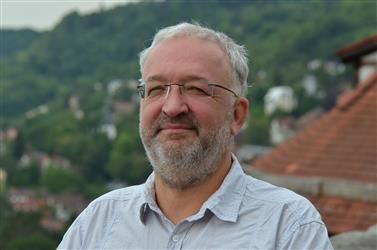ProjektStabilisierung der Erdoberfläche durch mikrobiologische Prozesse entlang eines Klimagradienten (Projekt 13 SPP…
Grunddaten
Titel:
Stabilisierung der Erdoberfläche durch mikrobiologische Prozesse entlang eines Klimagradienten (Projekt 13 SPP 1803 Earthshape)
Laufzeit:
01.01.2016 bis 31.12.2018
Abstract / Kurz- beschreibung:
Die Formung der Erdoberfläche wird global durch endogene tektonische Prozesse und exogene klimatische Prozesse gesteuert. Letztere beeinflussen maßgeblich die Verbreitung und Artenzusammensetzung von Flora und Fauna. Zudem ist ein Großteil der Erdoberfläche mit Böden und Sedimenten bedeckt, einer Schicht die besonders durch die Aktivität von Mikroorganismen bestimmt wird. Deren Rolle für die Oberflächenformung ist bislang jedoch wenig untersucht und gerade in den etablierten geomorphologischen Theorien bislang unberücksichtigt. Ausgehend von der Überlegung, dass die Umsetzung der organischen Substanz in Böden in erster Linie von Mikroorganismen geleistet wird, ist anzunehmen, dass diese auch einen wichtigen Beitrag zur Bodenstrukturbildung und zur Stabilität der Erdoberfläche beitragen. Mithin stellt sich die Frage inwieweit und durch welche Prozesse Mikroorganismen an der Stabilisierung der Erdoberfläche und somit an deren Formung beteiligt sind. Dieser Frage steht im Mittelpunkt des beantragten Projekts und soll entlang eines Klimagradienten von Nord nach Süd in Chile auf einheitlichem Ausgangsgestein gemeinsam von Mikrobiologen und Bodenwissenschaftlern nachgegangen werden. Wir nehmen an, dass die durch Mikroorganismen vermittelten Mechanismen der Strukturbildung in allen Klimaten gleich sind und die Prozesse sich in erster Linie in ihrer Frequenz und Amplitude sowie in der Zusammensetzung und Abundanz der beteiligten Mikroorganismen unterscheiden. Zur Prüfung dieser Hypothese werden entlang des Klimagradienten jeweils für einen Erosionsstandort, einen Akkumulationsstandort und einen im Sinne der Geomorphodynamik stabilen Referenzstandort Niederschlagssimulationsexperimente im Gelände und Strukturbildungsexperimente im Labor durchgeführt. Dabei wird die Bodenstrukturstabilität im Gelände als ein über Jahrhunderte bis Jahrtausende im Zuge der Pedogenese durch Selbstregulation entstandenes Gleichgewicht verstanden. Das Strukturbildungsexperiment im Labor untersucht die initiale Strukturbildung innerhalb eines Jahres mit und ohne Beteiligung von Mikroorganismen. Der Vergleich der verschiedenen Reliefpositionen dient zur Beantwortung der Frage, wie sich Materialverlagerung und Oberflächenformung auf die mikrobiellen Gemeinschaften des jeweiligen Klimaraums auswirken bzw. diese wiederum die Oberflächenstabilität beeinflussen. Erstmals werden dabei neben modernen mikrobiologischen und bodenwissenschaftlichen Methoden sowie Techniken aus der Bodenerosionsforschung, räumlich höchsthochauflösende bildgebende und isotopenchemische Verfahren aus Mikromorphologie (NanoSIMS), Mikrobiologie (SIP) und Nanoforschung (BeispielFISH-SIMS) kombiniert. In der konzeptionellen und experimentellen Verbindung von Bodenstrukturparametern mit räumlich hoch aufgelösten phylogenetischen Informationen und der mikro-skaligen Verteilung einzelner Elemente (NanoSIMS) wird es möglich sein Schlüsselprozesse der mikrobiologisch vermittelten Bodenstrukturbildung zu entschlüsseln, um die Mechanismen der Strukturstabilisierung durch Mikroorganismen zu erkennen und zu verstehen.
Schlüsselwörter:
mikrobielle Prozesse
Pedogenese
Mikromorphologie
Bodenstrukturstabilität
Biodiversität
biodiversity
Beteiligte Mitarbeiter/innen
Leiter/innen
Fachbereich Geowissenschaften
Mathematisch-Naturwissenschaftliche Fakultät
Mathematisch-Naturwissenschaftliche Fakultät
Forschungsbereich Geographie
Fachbereich Geowissenschaften, Mathematisch-Naturwissenschaftliche Fakultät
Fachbereich Geowissenschaften, Mathematisch-Naturwissenschaftliche Fakultät
SFB 1070 - RessourcenKulturen. Soziokulturelle Dynamiken im Umgang mit Ressourcen
Sonderforschungsbereiche und Transregios
Sonderforschungsbereiche und Transregios
Mathematisch-Naturwissenschaftliche Fakultät
Universität Tübingen
Universität Tübingen
Fachbereich Geowissenschaften
Mathematisch-Naturwissenschaftliche Fakultät
Mathematisch-Naturwissenschaftliche Fakultät
Forschungsbereich Geographie
Fachbereich Geowissenschaften, Mathematisch-Naturwissenschaftliche Fakultät
Fachbereich Geowissenschaften, Mathematisch-Naturwissenschaftliche Fakultät
Weitere Mitarbeiter/innen
Bernhard, Nadine
Forschungsbereich Geographie
Fachbereich Geowissenschaften, Mathematisch-Naturwissenschaftliche Fakultät
Fachbereich Geowissenschaften, Mathematisch-Naturwissenschaftliche Fakultät
Lokale Einrichtungen
Forschungsbereich Geographie
Fachbereich Geowissenschaften
Mathematisch-Naturwissenschaftliche Fakultät
Mathematisch-Naturwissenschaftliche Fakultät
Geldgeber
Bonn, Nordrhein-Westfalen, Deutschland
Bonn, Nordrhein-Westfalen, Deutschland


